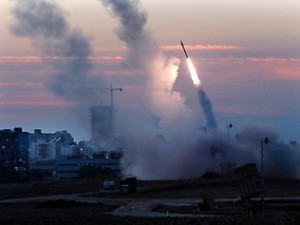 �Do you remember South Lebanon? All of Lebanon is now South Lebanon.�
�Do you remember South Lebanon? All of Lebanon is now South Lebanon.�These were the words of a senior Israeli official in a closed-door meeting in Jerusalem on Tuesday, just hours before Israel warplanes attacked a truck convoy suspected of carrying advanced�weapons systems�from Syria to Hezbollah in Lebanon.
It wasn�t hard to figure out that something was brewing. Two days earlier, the Israelis had redeployed�two Iron Dome anti-missile batteries�from its embattled southern front to the country�s north, near Lebanon. Coincidentally, journalists were also buzzing about�marathon meetings�between Israeli Prime Minister Benjamin Netanyahu and his senior military and intelligence planners.
At the time, however, all eyes were on Syria. And understandably so. The security of President Bashar Assad�s chemical weapons, the rise of al-Qaeda groups like Jabhat al-Nusra, and the threat of general instability in war-torn Syria all threatened the quiet that has prevailed on Israel�s shared border since the Yom Kippur War of 1973.
In other words, Syria was not exactly a red herring, but it distracted from Lebanon, where the Iranian-backed Hezbollah faction has armed itself to the teeth and is preparing for another opportunity to tangle with Israel.
The last battle, in the summer of 2006, was brutal for both sides. Hezbollah fired an estimated�4,000 rockets�into Israeli population centers, killing 159 citizens. Israel responded with some 12,000 sorties, killing some 1,200 Lebanese. Though Israel delivered several debilitating blows to Hezbollah, the war ended the Iranian proxy still firmly entrenched in Lebanon.
Today, by leveraging its military power in the Lebanese political arena, Hezbollah is now in control of the government. In the process, it has spread its influence from beyond Lebanon�s south and the eastern Beqaa Valley. Indeed, the Israelis warn that Hezbollah has installed rocket silos and weapons caches throughout the country.
The exact number of rockets in Hezbollah�s hands right now is not known. Conservative estimates indicate that it�s around 60,000. And Israel�s military establishment is keenly aware that it�s not a question of if Hezbollah will use them, it�s a question of when.
In all likelihood, whenever Iran wishes to make war � in retaliation for Israel�s recent air strikes against the convoy in Syria, in response to a perceived threat against the Iranian nuclear program, or for any other reason � Hezbollah will likely be the actor to prompt it.
Israelis say that this war could be very costly in terms damage to Israel, particularly if longer-range rockets target Haifa, Tel Aviv, and other high-density cities. But the Israelis are also nervous about how the war will impact Lebanon. Given the way Hezbollah has reportedly squirreled away its ordnance in heavily populated areas, even Israeli surgical strikes will almost certainly yield mass casualties. Lebanese citizens are reportedly aware of this, and the anxiety level is rising there, too.
�The world needs to be prepared for the next war with Lebanon,� the aforementioned senior official told me in Jerusalem. �It could be a very bad war.�
Until now, with troubling news coming out of Iran, Syria, Gaza and elsewhere, the Lebanon front has been largely ignored. But beware. A new conflict with Israel and Lebanon may be looming. And this conflict could erupt in a flash.
By The Globe and Mail
The Iran Project is not responsible for the content of quoted articles.










